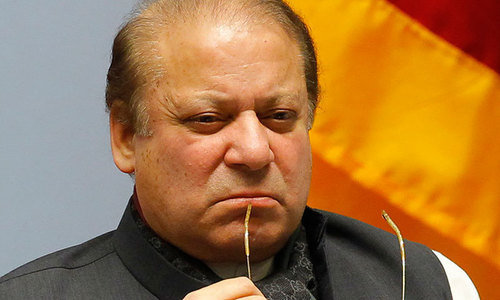ISLAMABAD: As the three-judge Supreme Court bench seized with the Panama Papers case formally takes up the Joint Investigation Team (JIT) report on Monday, Prime Minister Nawaz Sharif’s legal team is still weighing its options and is expected to give final shape to it after the first hearing.
That Mr Sharif’s strategy is still not final may be judged from the fact that objections to the report on behalf of the prime minister and his family were not filed before the court until Saturday, contrary to earlier decisions.
It is anticipated that the objections may not be filed even on Monday. This disappointed journalists who had gathered outside the court on Saturday in the hope that a challenge to the JIT report highlighting possible loopholes in it would be shared by senior counsel for the PM, Khawaja Haris Ahmed with the media.
Supreme Court may refer Panama Papers case to trial court, say senior lawyers
The delay might have been caused by the legal team’s advice to the prime minister to adopt the approach of “less is more,” commented a senior Supreme Court lawyer, who did not want to be named.
He said the hearing would not conclude on Monday and defence side might seek time to submit objections to the JIT report after going through the voluminous document.
“The less is said, the more surprise will be in store for the other side to come prepared and forcefully rebut what line of arguments is adopted by the defence side,” he said.
Meanwhile, Pakistan Tehreek-i-Insaf (PTI) spokesperson Fawad Chaudhry said the party had asked its counsel Naeem Bokhari to advance precise arguments before the court, which should revolve around disqualification of the prime minister under Articles 62 and 63 of the Constitution.
“We believe it is a concluded case as the International Consortium of Investigative Journalists, two judges of the Supreme Court and now the JIT have identified the prime minister as a guilty party,” he said.
Mr Chaudhry expressed surprise over the PML-N’s plan to file objections to the JIT report, saying “such a challenge is unheard of; the JIT report is not likely to be opened to objections, particularly when it has become a criminal case after the JIT report”.
Another senior lawyer, who also wished not to be named, was of the view that the Sharifs wanted to assess whether the court would positively respond to them by affording them time to listen to their objections.
He said incriminating evidence had already been given through contradictory statements by the prime minister and members of his family and through unnecessary filing of documents before the apex court.
Patient hearing likely
“And if not in view of insistence of the petitioners, PTI chief Imran Khan and others, it will be better for the defence side to unfold their defence before the trial court where the matter is expected to be referred to,” he said. “But it is unthinkable that the court will not afford patient hearing to the defendants.”
The lawyer said if during the course of the proceedings, the defence side was convinced that the Supreme Court bench was inclined to refer the matter to the trial court, then they would obviously speak less in the apex court though they would continue to issue political statements through different leaders outside the court.
One must remember that though an inquiry officer or investigator never gave any benefit of doubt to an accused, it was quite easy to get the same from court, he said.
But he believed that apart from referring to the matter for trial, the Supreme Court might initiate disqualification proceedings against the prime minister, his son-in-law retired Captain Mohammad Safdar and Finance Minister Ishaq Dar on the grounds of perjury or misstatement before the court.
This was also demanded in the initial petition by Imran Khan, who reiterated the demand during his media talk on Saturday.
To save themselves from imminent disqualification, the Sharifs would resort to challenging the JIT report on the basis of alleged lack of fairness, bias and procedural impropriety.
Yet another senior lawyer said the case would probably be referred to the trial court with strict timelines because at best the JIT report was just a report, not a conviction — and many people had been acquitted after such reports.
After the decision of the trial court, it would be referred to Speaker National Assembly and then to the Election Commission of Pakistan and the final decision would then be challenged before the apex court, he added.
Transcripts
Meanwhile, the attorney general office on Saturday submitted to the Supreme Court 106-page transcripts of 15 statements of Railway Minister Khawaja Saad Rafique, PML-N MNA Talal Chaudhry and Political Secretary to the PM Asif Kirmani.
At the last hearing on July 10, the court had ordered the AG to collect and submit the transcripts of their speeches relating to the JIT and the court proceedings.
Published in Dawn, July 16th, 2017













































